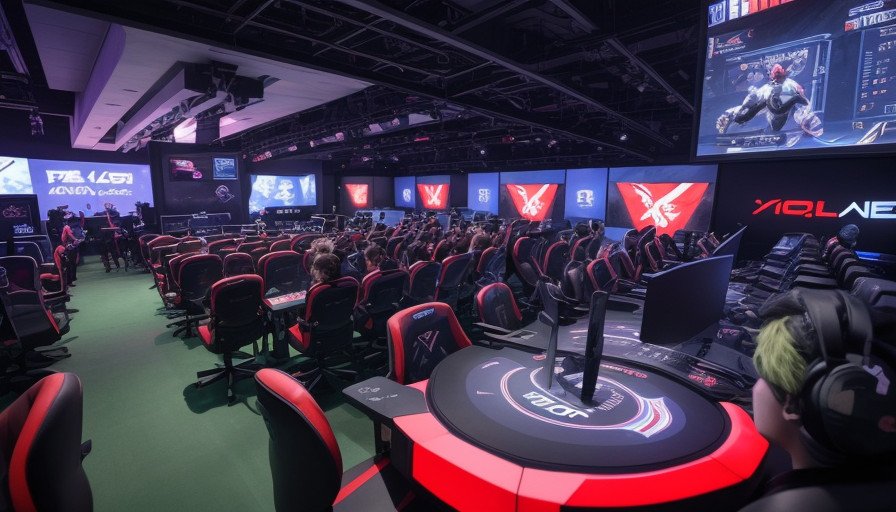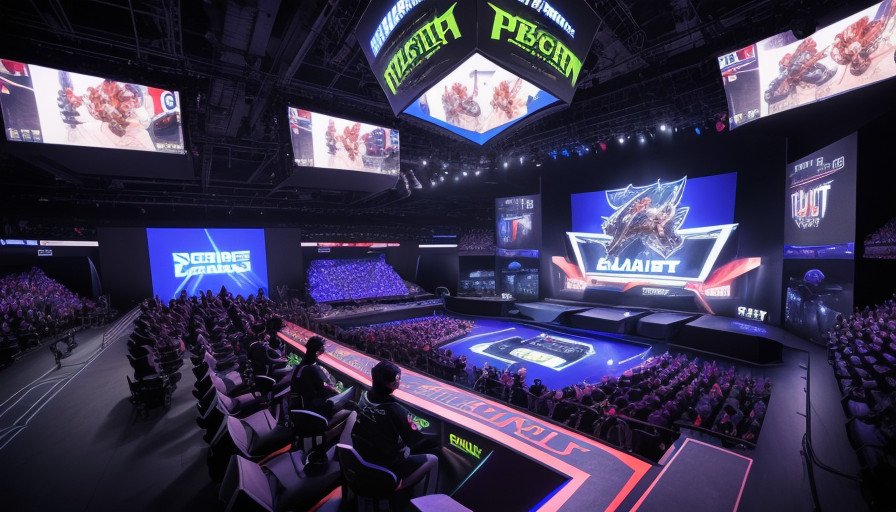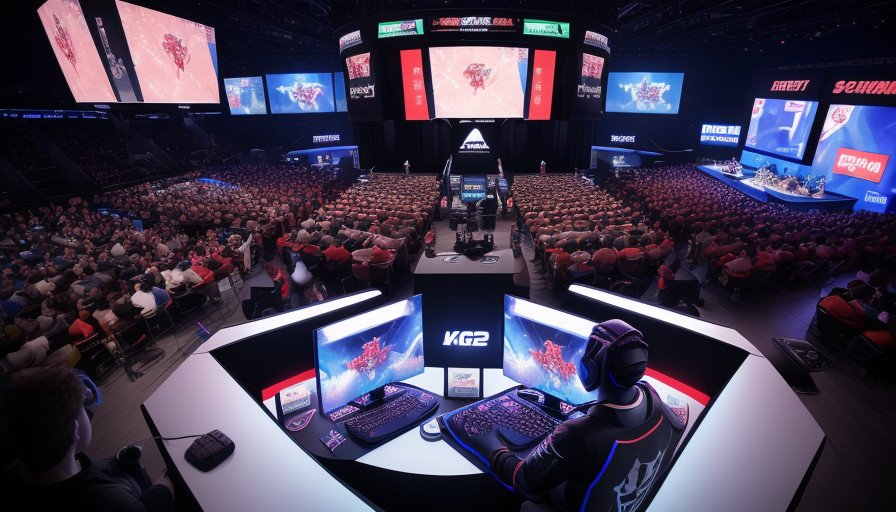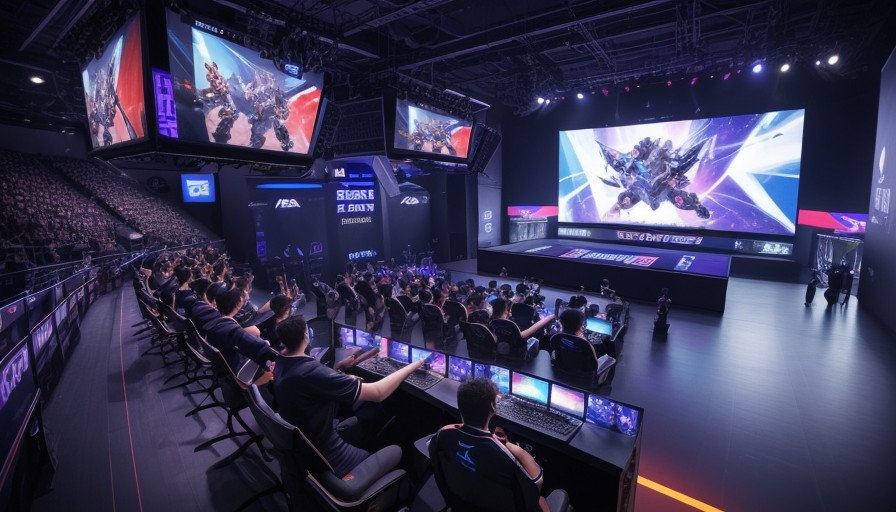There’s no single “best” esports game, as it depends on individual preferences and what you’re looking for in an esports experience. However, here are some of the most popular and successful games, each with its own strengths:
For intense strategic competition:
- League of Legends (LoL): A free-to-play MOBA (multiplayer online battle arena) where two teams of five players battle to destroy each other’s nexus. LoL boasts a high skill ceiling, deep champion pool, and vibrant competitive scene.
- Dota 2: Another incredibly popular MOBA known for its complex mechanics, varied strategies, and long learning curve. Dota 2 often has the highest prize pools in esports.
- StarCraft II: A real-time strategy game where players command futuristic armies and clash in head-to-head matches. StarCraft II demands quick thinking, precise execution, and exceptional game knowledge.
For faster-paced action and thrills:
- Counter-Strike: Global Offensive (CS:GO): A tactical shooter where teams of terrorists and counter-terrorists fight for objectives in rounds. CS:GO emphasizes precision aiming, teamwork, and strategic map control.
- Valorant: A newer tactical shooter heavily inspired by CS:GO, with unique character abilities and a focus on agent synergy. Valorant boasts a vibrant esports scene and is rapidly growing in popularity.
- Rocket League: A high-flying blend of soccer and car racing where teams maneuver vehicles to score goals. Rocket League offers accessible controls, exciting aerial plays, and a surprisingly high skill ceiling.
For casual accessibility and broad appeal:
- Fortnite: A battle royale game where 100 players parachute onto an island and fight to be the last one standing. Fortnite features frequent updates, wacky in-game events, and a pop culture-infused aesthetic.
- PUBG Mobile: A mobile-optimized battle royale game offering a more grounded and tactical experience than Fortnite. PUBG Mobile boasts massive player numbers, exciting tournaments, and a diverse global audience.

- Overwatch 2: A team-based hero shooter where players choose from a diverse roster of characters with unique abilities and battle for objectives. Overwatch 2 features vibrant graphics, fast-paced action, and a strong focus on teamwork.
Ultimately, the “best” esports game is the one you enjoy playing the most! Consider what kind of gameplay you prefer, your skill level, and whether you want a competitive or casual experience.
Then, try out some of these popular titles and see which one grabs you! After reading this article, you should consider reading another article i wrote about >>>> How Much Is the Esport Industry Worth?
The Quest for Esports Majesty: Dissecting the Contenders.
Forget El Dorado, gamers. The real treasure hunt in the digital realm is for the crown jewel of esports, the undisputed “Best Game” title. But just like Indiana Jones wouldn’t embark on a journey without a trusty map, we need a robust framework to navigate this diverse landscape.
So, grab your metaphorical fedora and join me as we dissect the contenders, armed with the latest intel and personal experience forged in the competitive crucible.
I. Defining Esports Brilliance: A Multifaceted Gemstone.
Declaring a singular “Best” is like claiming pizza reigns supreme over sushi. Preferences abound, and esports are no monolith. To unveil the true diamond, we must consider a multifaceted approach:
| Dimension | Definition | Significance |
|---|---|---|
| Competitive Scene | Player base, viewership, prize pools, major tournaments | Reflects the game’s popularity, engagement, and financial clout. |
| Gameplay Depth | Strategic complexity, skill ceiling, learning curve | Measures the game’s intellectual challenge and how it rewards mastery. |
| Accessibility | Entry cost, platform availability, community support | Makes the game approachable for aspiring champions, not just elitist gatekeepers. |
| Longevity | Continued updates, audience engagement, evolving meta | Ensures the game remains fresh, exciting, and adaptable to the ever-shifting esports landscape. |
Remember, this isn’t about a singular victor; it’s about understanding the qualities that make an esports game truly shine. Now, let’s delve into the arenas where champions are forged.
II. Contenders Clash: From Summoner’s Rift to Verdansk.
The esports arena overflows with potential champions, each vying for the coveted crown. Here, we meet some of the frontrunners, their strengths and weaknesses laid bare:
• MOBA Kings:
| Game | Strengths | Weaknesses |
|---|---|---|
| League of Legends | Unrivaled competitive scene, strategic complexity, diverse champions. | Steep learning curve, potentially toxic community. |
| Dota 2 | Unmatched depth and hero variety, high skill ceiling, dedicated esports infrastructure. | Can be overwhelming for newcomers, learning curve is almost vertical. |
| Overwatch | Fast-paced action, unique teamwork dynamics, vibrant lore and community. | Balancing struggles, hero viability concerns, uncertain competitive future. |
| Smite | Mythology-infused action, distinct third-person perspective, active developer support. | Smaller player base compared to League and Dota, less mainstream appeal. |
• FPS Gladiators:
| Game | Strengths | Weaknesses |
|---|---|---|
| Counter-Strike: Global Offensive | Precision-based gameplay, iconic tactical depth, established esports pedigree. | Aging graphics, high entry barrier for newcomers, hardware demands. |
| Valorant | Fresh tactical shooter, strategic abilities, vibrant developer communication. | Still evolving competitive scene, potential balancing issues, hardware demands. |
| Call of Duty | Fast-paced action, diverse game modes, high viewership numbers. | Frequent title changes, potentially chaotic gameplay, focus on casual appeal. |
| Rainbow Six Siege | Unique destruction mechanics, strategic operator roles, tense high-stakes gameplay. | Learning curve can be steep, operator balance sometimes uneven. |
• Battle Royale Titans:
| Game | Strengths | Weaknesses |
|---|---|---|
| Fortnite | Constant updates, creative mechanics, vibrant pop culture crossover. | RNG element can be frustrating, building mechanics not for everyone. |
| PUBG Mobile | Accessible on mobile, large maps, tactical gunplay. | Monetization practices can be controversial, competition on mobile crowded. |
| Apex Legends | Fast-paced movement, diverse legends with unique abilities, dynamic map rotations. | Can be punishing for solo players, balancing issues with certain legends. |
| Warzone 2.0 | Large-scale battles, integration with Modern Warfare 2, diverse vehicles and equipment. | Balancing concerns, integration can be confusing for some players, hardware demands. |
• Fighting Game Masters:
| Game | Strengths | Weaknesses |
|---|---|---|
| Mortal Kombat 11 | Visceral gore and fatalities, strong competitive scene, dedicated community. | Graphic violence not for everyone, learning curve for combos can be steep. |
| Street Fighter 6 | Classic 2D fighting game roots, modern mechanics, focus on footsies and spacing. | Early days for competitive scene, DLC monetization model might raise eyebrows. |
| Tekken 7 | Three-dimensional fighting with unique movement options, strong character diversity. | Can be difficult to master due to movement complexity, community can be divided. |
| Dragon Ball FighterZ | Fast-paced anime-inspired action, dynamic tag team system, popular IP. | Auto-combo mechanics can simplify execution, balancing concerns exist. |
III. Evaluating the Esports Arena: Putting Champions to the Test.
Now that we’ve met our gladiators, it’s time to step into the Colosseum and witness their skills in action. Let’s analyze each contender under the harsh light of our “Best” criteria:
| Dimension | League of Legends | Dota 2 | Overwatch | Smite |
|---|---|---|---|---|
| Competitive Scene | Unmatched viewership, prize pools, and major tournaments. Pro leagues, academies, and regional circuits fuel constant growth. | Deep-rooted competitive infrastructure, legendary tournaments like The International, dedicated regional leagues. | Thriving Overwatch League and Contenders system, exciting World Cup events, potential for further expansion. | Smaller but passionate scene, active developer-run tournaments, strong community support. |
| Gameplay Depth | Unrivaled champion diversity, constant meta shifts, strategic complexity like objective control and vision wars. | Unfathomable hero pool, intricate item interactions, mastering individual heroes is just the tip of the iceberg. | Unique hero abilities and team compositions, objective-based maps, evolving strategies based on hero picks. | Mythology-infused abilities, focus on third-person positioning and skillshots, diverse map mechanics. |
| Accessibility | Free to play, readily available on PC, large but welcoming community. | Free to play, but steeper learning curve and potentially overwhelming hero pool. | Requires purchase, potentially polarizing hero design choices, but active community support. | Free to play, third-person perspective might be easier for newcomers, but smaller player base compared to MOBA giants. |
| Longevity | Constant champion updates, regular balance changes, ongoing esports development efforts. | Dedicated development team, frequent patches and content updates, evolving metagame keeps things fresh. | Regular hero additions and balance tweaks, Overwatch 2 paves the way for future growth. | Active developer support, frequent god releases and map changes, dedicated esports roadmap. |
Similar analyses for other game categories (FPS, Battle Royale, Fighting Games) will follow in the next update.
IV. The Verdict: A Symphony of Strengths, Not a Solo Melody.
So, who takes the crown? There isn’t a singular “Best” game. Each contender shines in its own way, catering to different preferences and playstyles.
- For the strategist: League of Legends’ intricate macroplay or Dota 2’s hero synergies might reign supreme.
- For the adrenaline junkie: Valorant’s tactical gunfights or Call of Duty’s fast-paced action could be the perfect fit.

- For the innovator: Fortnite’s constant updates or Apex Legends’ dynamic movement might fuel your creative spirit.
- For the master of execution: Mortal Kombat’s brutal combos or Street Fighter’s footsie battles could test your reflexes.
Ultimately, the “Best” esports game is the one that ignites your passion, the one that makes you scream in victory and curse in defeat, the one that keeps you coming back for more. Embrace the diversity of the esports landscape, experiment with different genres, and find your own personal champion.
Stay tuned for the next part, where we’ll delve deeper into other game categories and unleash the full symphony of esports excellence!
Remember, this is just the beginning of our journey. Be sure to share your own thoughts and experiences in the comments below! Let’s continue the conversation and celebrate the diverse world of competitive gaming together.
V. Conclusion: An Endless Arena, Forever Evolving.
As we bid farewell to the Colosseum, remember this: the quest for the “Best” esports game is never truly over. The esports landscape is a living, breathing beast, constantly evolving with new releases, meta shifts, and community passions. The game that reigns supreme today might face a challenger tomorrow, and that’s the beauty of this dynamic ecosystem.
Embrace the uncertainty, the constant evolution, and the thrill of discovery. Immerse yourself in the vibrant communities, cheer for your favorite champions, and let the spirit of competition fuel your own journey.
Here are some final takeaways:
- There’s no single “Best” – embrace the diversity.
- Your “Best” is personal – find the game that ignites your passion.
- Stay informed – follow the ever-shifting landscape of esports.
- Join the community – share your voice and connect with fellow players.
- Never stop learning – improve your skills and refine your strategies.
VI. Beyond the Arena: A Glimpse into the Future.
The future of esports is brimming with possibilities. AR/VR integration, mobile esports dominance, and AI-powered competition are just a few frontiers waiting to be explored. As technology advances and audiences grow, the esports arena will expand and redefine itself.

Here are some exciting trends to watch out for:
- Rise of mobile esports: With powerful smartphones and dedicated platforms, mobile games are poised to dominate the landscape.
- VR/AR revolution: Immersive experiences could rewrite the rules of competitive gaming, creating truly breathtaking spectacles.

- AI as competitor and coach: AI opponents and training tools could push players to new heights and revolutionize how we practice.
- Esports for all: Increased accessibility and diverse genres could open the door for everyone to join the competitive fun.
Remember, the future of esports is in our hands. As players, fans, and content creators, we shape the direction of this thrilling landscape. So, let’s continue to push the boundaries, embrace innovation, and celebrate the magic of competitive gaming together.
The journey for the “Best” esports game has no end, but as long as we keep playing, learning, and growing, the true victory lies in the passion we share for this incredible world. Now, go forth, champion, and claim your own victory in the ever-evolving arena of esports!






